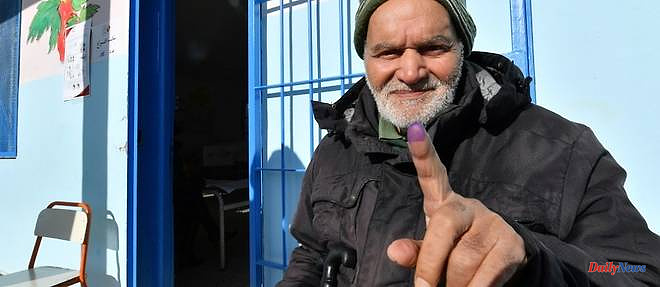Very few Tunisians turned out on Sunday to elect a Parliament devoid of real powers, inflicting a new disavowal on President Kais Saied and the political reforms he has imposed since his 2021 coup, in a country mainly concerned about its economic problems. .
The president of the Isie electoral authority, Farouk Bouasker, announced a provisional turnout of 11.3% in the second round of legislative elections, compared to a preliminary figure of 8.8% in the first round.
Participation was the main issue in the ballot after an abstention of almost 90% in the first round, a record since the advent of democracy in the cradle country of the Arab Spring 12 years ago.
The young people who brought Mr. Saied to power in 2019 massively shunned the ballot box with just under 5% of voters aged between 18 and 25.
"I don't trust the political class. Saied could make a radical change. He (...) did nothing," laments Omrane Dhouib, a 37-year-old abstentionist baker interviewed in Tunis.
The election of 131 deputies (out of 161 seats, of which 30 have already been filled) represents the final stage of the process launched 18 months ago by President Kais Saied to return to a hyper-presidentialist system, similar to that before the revolution. of 2011 and the fall of dictator Ben Ali.
Considering the country ungovernable, Mr. Saied seized all powers on July 25, 2021, then revised the Constitution last summer to abolish the hybrid parliamentary system in force.
Experts attributed the low attendance to various factors.
First, despite strong divisions that prevent it from mobilizing in the street, the opposition, including Ennahdha, the Islamist-inspired party that dominated Parliament over the last decade, boycotted an election marking, according to it, the outcome of a "coup" by Mr. Saied.
Another factor: the majority of the candidates were unknown and without political affiliation.
The few voters therefore made personal choices.
Belhassen Ben Safta, a 60-year-old taxi driver, voted to "never give the old system (Ennahdha) a chance to come back. They are responsible for our misery."
In Gafsa, a hundred km further south, Mohamed Tlijani and Ali Krimi, two fifties, came to vote for a cousin, believing "to have the right to be represented in Parliament".
According to experts, part of the population, sharing Mr. Saied's aversion to political parties, approves of his limiting the powers of the future parliament. It will be very difficult for him to overthrow the government and it will be impossible for him to dismiss the president.
"Given the disinterest of the population" for politics, "this Parliament will have little legitimacy, the president, all-powerful thanks to the Constitution of 2022, will be able to dominate it as he pleases", note for AFP Youssef Cherif, expert from Columbia Global Centers.
The attention of the 12 million Tunisians is elsewhere.
"I never vote. All economic sectors are suffering and Saied is not interested in it," said Mohamed Abidi, a 51-year-old waiter in Tunis.
Tunisians have seen their purchasing power plummet with inflation above 10% and endure shortages of subsidized foodstuffs such as milk, sugar or oil.
For economists, they come from supply disruptions because the state lacks cash to pay for these centralized purchases.
Growth is sluggish (less than 3%), unemployment high (more than 15%), poverty is increasing and more than 32,000 Tunisians emigrated illegally last year.
Reason for additional concern: negotiations with the IMF for a loan of 1.9 billion dollars, the key to other foreign aid, have been stalling for months. This led the American agency Moody's to downgrade the rating of Tunisia's long-term debt by another notch on Saturday, judging "higher" the risk of default.
The blocking of the talks is said to be due to disagreements between President Saied and his government on the program submitted to the IMF in exchange for its aid.
Saied, experts say, is hesitant to adopt unpopular measures like lifting commodity subsidies and restructuring over-indebted and overstaffed state-owned enterprises.
01/29/2023 20:11:03 - Tunis (AFP) - © 2023 AFP












